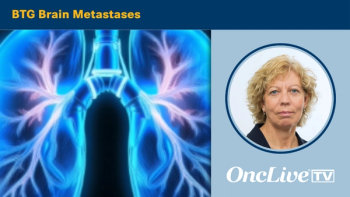
Pathology and Treatment Decisions in Lung Cancer
Transcript:David Spigel, MD: As a medical oncologist, you care about pathology. Sometimes we think, “Oh, that’s just for the pathologist to worry about,” but these days in managing lung cancer, pathology is everything. You need to know, first of all, what kind of lung cancer and what kind of non—small cell lung cancer you’re dealing with. Is it an adenocarcinoma or squamous disease? But then, we’re asking additional questions of our pathologists. We want to know the molecular profile. Does the patient have an EGFR-mutated, ALK-mutated, or ROS-mutated tumor? Is there PD-L1 expression?
These kinds of things are so crucial, in terms of knowing them right away so that you can make treatment decisions in the first-line setting. Even though I’m not a pathologist, I often feel like I am because I want to know all of these answers pretty quickly. It speaks to the importance of good communication: frequently interacting with, talking to, e-mailing, or even texting my pathologist when I meet new patients to let them know what I’m waiting on and what I need so that we can get information back that makes sense for designing a treatment plan.
Gerald J. Berry, MD: In terms of molecular testing in the community, I’m a strong advocate for performing as many of these tests up front as possible. The technology and the techniques required to do the testing are quite sophisticated and expensive, so you really need to be doing a large volume of tests in order to want it in your own institution. But there are certainly very good commercial labs that will do all of the molecular testing and provide very good and very prompt service. So, I think that I’m an advocate for doing the testing up front.
The other thing is that some of these tests do take some time—particularly, the molecular testing can take many, many weeks. So, the sooner that it’s initiated, the sooner that the results are available. If the patient is going to come to a tertiary institution for evaluation and recommendation, you hope that all of those results are available at the time of their visit. It moves things along and allows institutions to initiate the different therapeutic modalities much sooner.
In communicating with clinicians with respect to the test results from ancillary studies, most of that information is available in the electronic medical record. What I tend to do is—on specific results, on specific tests—send either a security mail or a telephone call to the clinician. For example, in the ALK and ROS mutation-positive patients, because they represent 3% to 5% of patients—it’s uncommon to have a positive result—I will inform the clinicians directly. The results of mutational testing often take 4 weeks or more, so those reports are prepared by our molecular pathology department.
David Spigel, MD: Lung cancer has gotten pretty complicated, whether you’re taking care of patients in an academic center or in the community, where most patients are cared for. And as a medical oncologist, you’re trying to answer a lot of questions. You’re trying to figure out what kind of lung cancer you’re treating and, more specifically, is this a treatment that could include an oral therapy that goes against a molecular target? Is it immunotherapy I want to use? Is it chemotherapy?
As a community oncologist, you’re wanting to know a lot of information up front for that first visit with a patient, whether it’s in the hospital or in your office. You’re wanting to know what kind of lung cancer the patient has: adenocarcinoma or squamous. You’re wanting to know if it is an EGFR-mutated cancer. Is it a ROS-mutated or ALK-mutated cancer? And these are just the markers we ask for now. Very soon, we’re going to be asking for BRAF and HER2 mutation testing, maybe RET mutation testing. These kinds of pieces of information help you to make the best decision for a patient.
The other big area has been the role of PD-L1 testing, looking to see if your patients are candidates for upfront immunotherapy. And these days, at least for now, we demand to know whether or not our patients have a high expression of PD-L1. That has become a relatively recent request for pathologists. In addition to these molecular tests, I need to know, does my patient have a PD-L1 expressing tumor? These are all things you need to know. It reminds me of the way we used to think about breast cancer management, where you had to know 3 things—hormone status, ER/PR, and HER2 status—to make treatment decisions. And that’s very true in lung cancer right now. You have to know these things to offer your patients the best standard care in the first-line setting.
Transcript Edited for Clarity


































